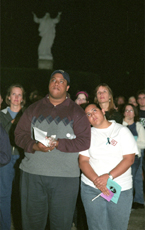Finance junior Elizabeth Cuchens marched for an end to sexual violence Tuesday night.
Although it was the first time that she spoke out against this type of crime, Cuchens said it would not be the last.
“There are too many people close to me who have been affected by sexual abuse,” she said. “I never realized that. This issue cannot be ignored.”
The 13th annual Take Back the Night march had the biggest turnout in three years, said march coordinator Connie Briscoe. More than 450 people attended the initial program in the Horseshoe, she said.
About 200 marched to Tulane’s Pocket Park to listen to music and testimonies from victims of sexual violence.
Briscoe said that the march’s goal is to increase the awareness of sexual violence on campus as well as in the community.
“Teaching sexual communication is a huge part of the prevention of sexual violence,” Briscoe said. “Increased awareness is the first step in learning how to be powerful and communicative about sexuality.”
Suzanne Dietzel, the director of the Women’s Resource Center and an avid participant in the march, agreed that spreading the word about sexual violence is key in its prevention.
“This issue is important, not only to the Loyola community, but also the community at large,” Dietzel said. “One in three women will be a victim of sexual violence. That is not a pretty statistic.”
Classical studies senior Sonnet Brown, who has participated in the march for four years, said that education of men as well as women is key to the prevention of sexual violence.
She said that the number of men at the march surprised her and that the respect with which they treated the event was empowering.
Many student organizations also participated in the march, Briscoe said. The planning committee invited all student organizations to write their own organizational commitments to present to the assembly of people.
In the commitments, they outlined the ways in which they would work to stop sexual violence.
SGA president Bea Forlano said that SGA has always been involved with the march.
“I think it is one of the better community-focused events at Loyola,” Forlano said. “It really brings everyone together for a great cause.”
Briscoe said that, although a major role of the march is to increase awareness of sexual violence, the victims of sexual violence are always at the center of this event.
“This really exists so that many women can begin the healing process in an empowering environment,” she said. “This event is very powerful, encouraging, and supporting for these women.”
Brown agreed that the testimonies of the victims were incredibly moving.
“The most emotional, empowering moments take place in Pocket Park at Tulane at the open mic when the survivors get up and speak,” she said. “When you see these people getting up and crying, the situation and statistics become real to everyone, even those who haven’t been raped.”
Brown said that the non-threatening atmosphere of the march greatly contributes to the victims’ ability to share their stories.
Brown, who is a rape victim, gave her story in front of the crowd that gathered Tuesday night.
“I had no idea how powerful it could be,” she said. “I didn’t know very many people there, but I felt so safe and protected among these people.”
Brown also said that an important thing to remember about sexual violence is that it can happen to anyone at any time, and that it is a crime.
“I believe that sexual violence is one of the worst things you can do,” she said. “It’s about power and domination. It has nothing to do with sex. Everyone should remember that.”

Michele Abbene, biology junior, lights a candle at Take Back the Night in the Horseshoe Tuesday evening. Students, faculty and staff from Loyola and Tulane gathered to march against violence and to support family and friends.






